By K.J. Kwon and Jethro Mullen, CNN
updated 11:07 AM EST, Thu January 24, 2013
STORY HIGHLIGHTS
- NEW: North Korea is upset by a recent U.N. security council resolution, an analyst says
- Pyongyang says it plans a new nuclear test and further long-range rocket launches
- These are part of an "all-out action" targeting the U.S., it says
- North Korea has conducted two previous nuclear tests, in 2006 and 2009
The North's National
Defense Commission said the moves would feed into an "upcoming all-out
action" that would target the United States, "the sworn enemy of the
Korean people."
Carried by the state
media, the comments are the latest defiant flourish from the reclusive
North Korean regime, whose young leader Kim Jong Un has upheld his father's policy of pursuing a military deterrent and shrugging off international pressure.
The defense commission
statement follows a United Nations Security Council resolution on
Tuesday that the United States pushed for, condemning a recent recent
rocket launch by North Korea and expanded existing sanctions.
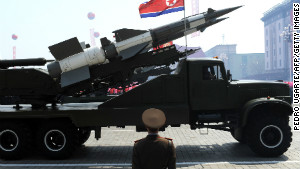 North Korea threatens new nuclear test
North Korea threatens new nuclear test
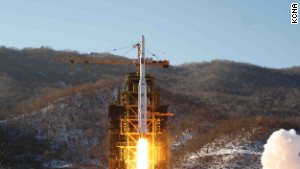 North Korea move in 'defiance' of U.N.?
North Korea move in 'defiance' of U.N.?
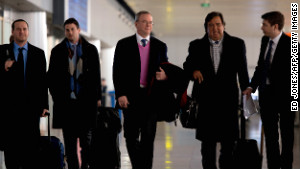 Richardson explains North Korea trip
Richardson explains North Korea trip
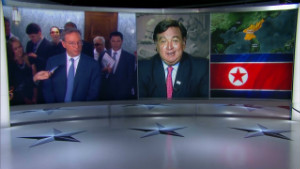 Richardson, Google chief to N. Korea
Richardson, Google chief to N. Korea
The North's angry
statement "should have been the expected outcome" from the U.N.
decision, said Daniel Pinkston, senior analyst for the International
Crisis Group covering Northeast Asia.
"I think they are completely outraged and insulted by it," he said.
North Korea, which often
issues bellicose statements in its state media, said Thursday that it
rejected all Security Council resolutions concerning it.
It described this week's
resolution as "the most dangerous phase of the hostile policy toward
the DPRK," using the abbreviated version of its official name, the
Democratic People's Republic of Korea.
Analyst: Threat meant as a deterrence
The threats toward the
United States, a constant theme in the North's propaganda, have more to
do with deterrence than a desire for full conflict, Pinkston said.
"I don't believe they
have the capability, the intention or the will to invade or destroy the
United States," he said. "They wish to deter interference from the U.S.
or any outside powers."
North Korea's successful
rocket launch last month nonetheless changed the strategic calculations
for the United States, showing that the North's missile program is
advancing despite an array of heavy sanctions imposed on it.
Analysts say it still
has a lot of work to do to master the technology necessary to mount a
nuclear warhead on missile or accurately target it.
At the same time, Pyongyang has been hinting for a while that a new nuclear test could be in the cards.
Just before the North
sent out its latest hostile statement Thursday, a U.S. State Department
official was telling reporters in Seoul that Washington hoped that
Pyongyang wouldn't go ahead.
"We think that that
would be a mistake, obviously," said Glyn Davies, the U.S. special envoy
on North Korea. "We call on North Korea, as does the entire
international community, not to engage in any further provocations."
North Korea has carried out two previous nuclear tests, in 2006 and 2009, both of which were condemned by the U.N.
Pyongyang didn't say
Thursday when exactly it would carry out a third test, but it could
happen "at any time," according to Pinkston.
He said that it was hard
for anybody outside the North Korean nuclear sector to know if the
country is technically ready to carry out the test, but that
politically, "it seems an appropriate time."
Demands unlikely to sway North
South Korean defense
officials said last year that they believed the North had been in a
position to carry out a new test whenever leaders in Pyongyang gave the
green light.
North Korea's nuclear
program is "an element of threat to peace not only for Northeast Asia
but also for the world," Park Soo-jin, deputy spokeswoman for the South
Korean Unification Ministry said Thursday.
"North Korea should
immediately stop its nuclear test and other provocation and should
choose a different path by cooperating with the international
community," Park said.
That appears unlikely at this stage, though.
After a failed
long-range rocket launch in April, North Korea ignored international
condemnation and carried out a second attempt last month. That one
succeeded in putting a satellite in orbit, Pyongyang's stated objective.
But the launch was
widely considered to be a test of ballistic missile technology. And it
remains unclear if the satellite, which the North insists is for
peaceful purposes, is functional.
Both North Korea's previous nuclear tests took place weeks or months after long-range rocket launches.
Those tests were carried
out under the rule Kim Jong Il, the father of the current leader, and
the man who channeled huge amounts of money into North Korea's nuclear
and missile development programs.
Kim Jong Il died in
December 2011 after 17 years in power, during which the North Korean
people became increasingly impoverished and malnourished.
Economically, the country relies heavily on trade with its major ally, China.
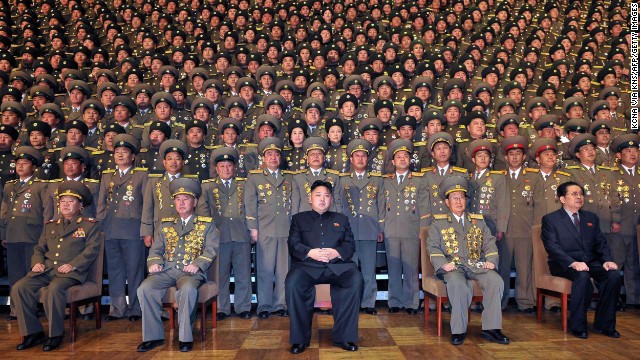 North Korean leader Kim Jong Un,
center, poses with chiefs of branch social security stations in this
undated picture released by North Korea's official news agency on
November 27, 2012. North Korea said Thursday that it plans to carry out a
new nuclear test and more long-range rocket launches, all of which it
said are a part of a new phase of confrontation with the United States.
North Korean leader Kim Jong Un,
center, poses with chiefs of branch social security stations in this
undated picture released by North Korea's official news agency on
November 27, 2012. North Korea said Thursday that it plans to carry out a
new nuclear test and more long-range rocket launches, all of which it
said are a part of a new phase of confrontation with the United States.
No hay comentarios:
Publicar un comentario